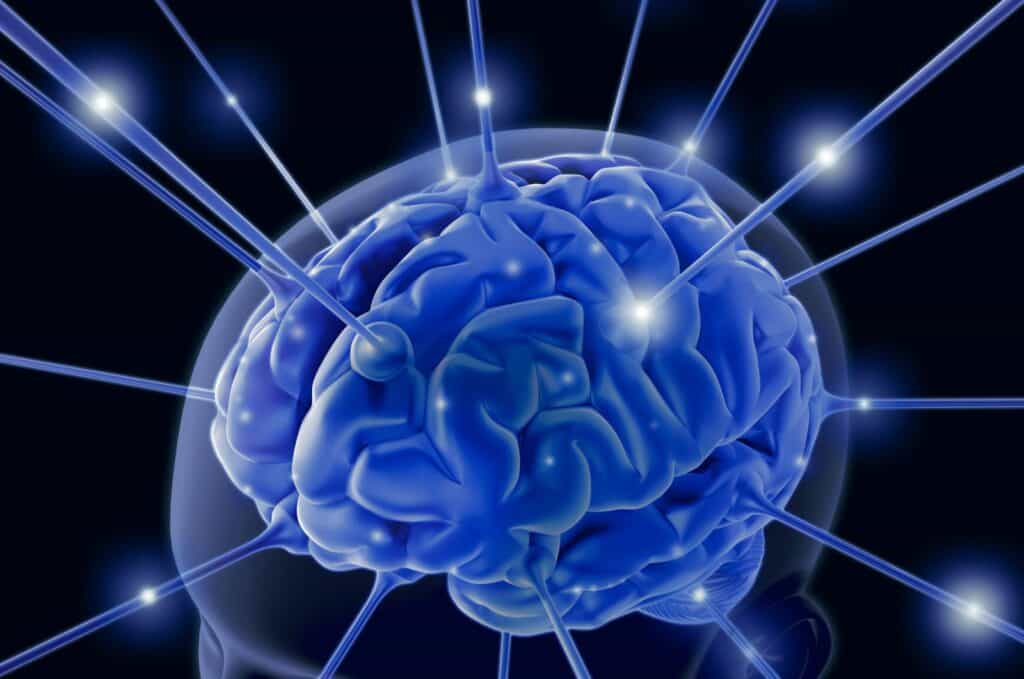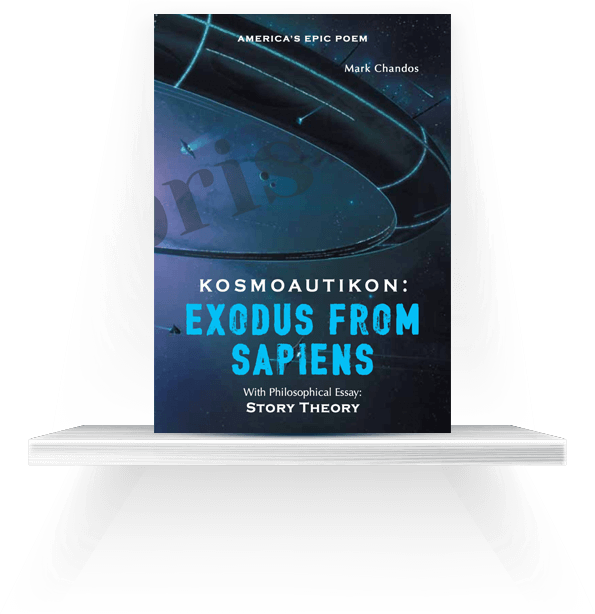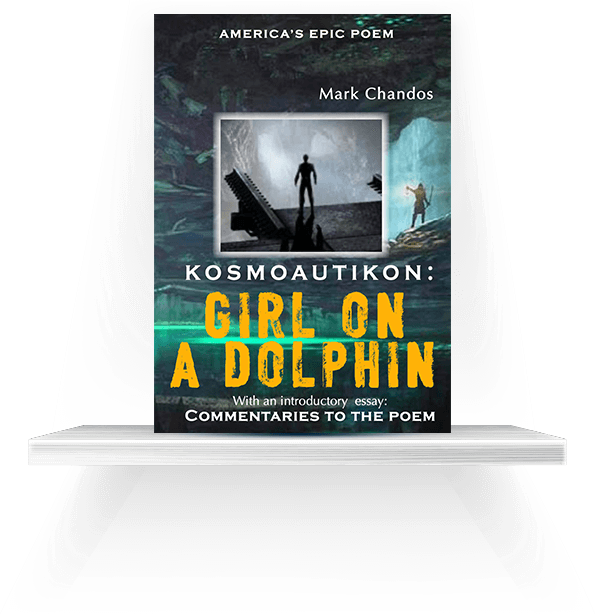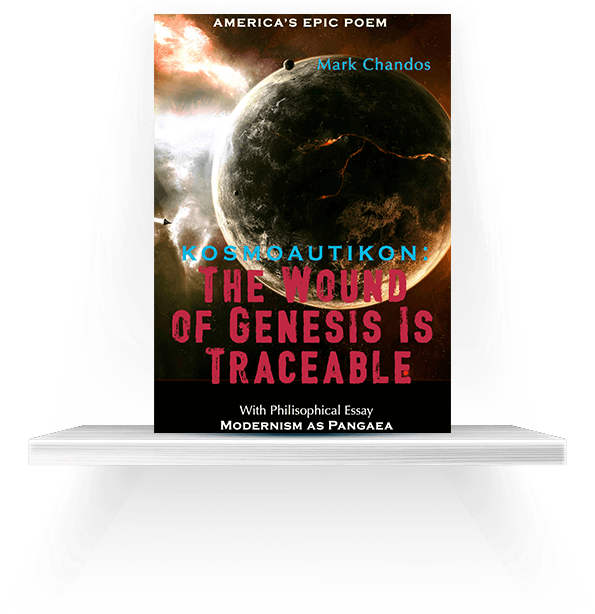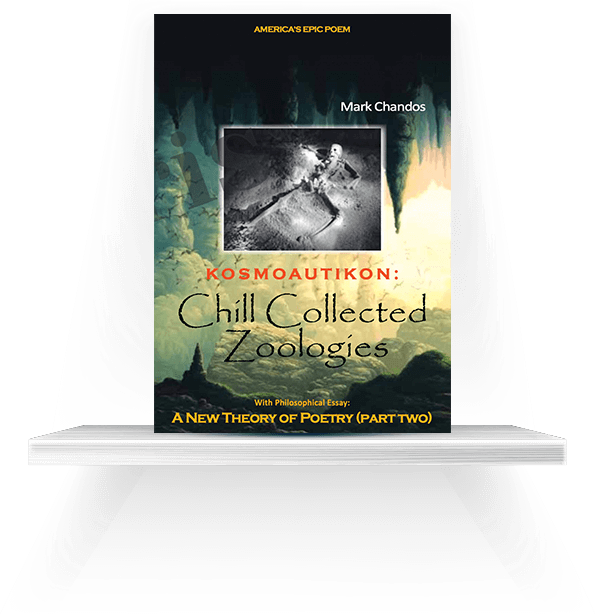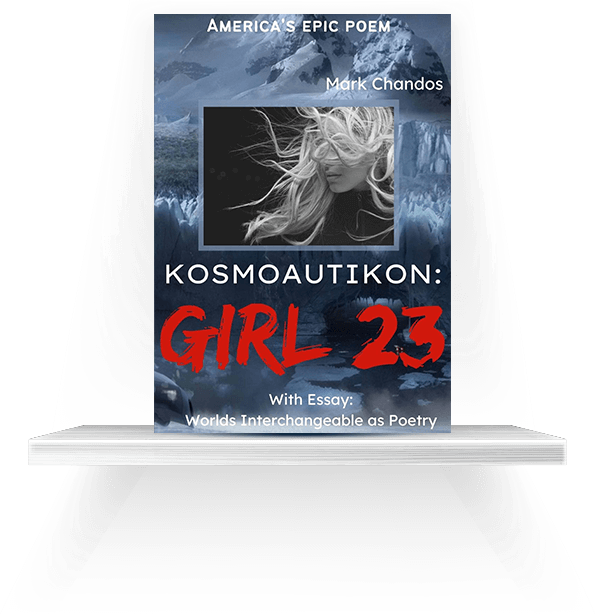Language Requires a Deus Ex Machina
Every language has a god. Every linguistic code quickly adopts its genius to express its projection of ultimate power. We can test this. The Hebrews found a god that would ensure that they were forever the chosen people. Hesiod and Homer made a genealogy of the gods for the Greeks (and Romans). Every human tongue starts with utility—but always ends with theology. We have our answer about the gods, therefore. Coiled within every linguistic machine exists a god. Every invention, wheel, zodiac, and ideology—every linguistic language—contains a god.
We can test this thesis with modern science. In the mid-19th century science was still struggling against the leviathan of Christianity. At that time (1840s), Christianity still was the chief authority of the purpose and origin of human life. Earnest missionaries still went out from the West and spoke of the saving grace of Christ and his angels. In the 1840s, science still had no way to make their vision of the world supreme.
Science had no way to compete with the Christian language of the human condition, that is, until they found Darwin. Darwin codified a new form of reality—evolutionary theory. It was a poetic imagining—based on very few specimens. From a few exotic observations he made wildly general and speculative assertions. He had no proof, he could not point to any significant missing links—but evolution theory seemed plausible to the rising men of science. Most importantly Darwin could be referenced as a weapon of authority to combat the Bible’s interpretation of creation. Instead of 4800 odd years as the Bible postulated, Darwin asserted that life evolved over millions of years—especially man. Darwin won—because he coined a famous poetic phrase that no one could forget—“survival of the fittest”. The Church lost its 2000 year reign of linguistic supremacy— over a poetic phrase! The language of science had found its deus ex machina (the god from out of the machine).
Darwin was wrong. Not only are there no evidences of all the missing links of the evolution of Homo sapiens from apes—there is no explanation how the human mind (the self-consciousness mind) originated from matter. The word “missing link” has even entered the language—so famous is the fossil lacuna in the record.
Second, Darwin does not explain the continued existence of apes. If Homo sapiens evolved naturally from apes—why are there still apes today in exactly the same state of existence (and ape fossils show there was no change at all)? Thirdly, the theory of evolution does not explain the non-evolution of creatures many times more ancient than Homo sapiens—creatures, moreover, which were separated by differing climates and environments.
Scorpions, dragonflies, and ants fossilized in amber up to 500 million years ago are exact replicas of modern insects—as if they were born in the same year—and the same climate! They were fossils of insects of ancient climates and continents differing from today’s environment. If simple creatures as scorpions, flies, and insects have not changed over 500 million years, how are we to believe that the most complicated animal—man— mutated from apes in only a fraction of that time? That’s a lot of mutation!
Darwin’s The Origin of Species is the greatest scientific hoax in the history of intellectual propaganda. Clearly something other than time and evolution are the actual agencies of the human mind. The only possible creator of the human mind—is another mind.
In fact, there was no radical evolution of these species to the degree hypothesized by Darwin. Few scientists even bother to talk seriously about Darwin at all today—there are too many embarrassing lacuna in the fossil records. It does not matter. Darwin had already served his purpose. He found the literature they needed. Any social movement needs a powerful phrase—and “survival for the fittest” was the perfect incantation that science needed to replace the previous poetry of the Christian civilization.
The theory of evolution was a linguistic assertion allowing science to have a rationale to eradicate and disprove the reality of life as proposed by the Christian Bible. What is more poetic than the memorable phrase “survival of the fittest”? A single poetic language (four words) brought down an entire Christian civilization! It has remained on every child’s tongue since the 19th century. And it wasn’t even ever proved to be true!
The point? Each linguistic code has a god embedded (a deus ex machina) that gives the language its justification to be the supreme civilization of the human condition. The Greeks had Homer and Hesiod. The Hebrews had Moses. The Christians had Paul. And the scientists had Darwin—to give a poetic plausibility to a new speech of human reality. Each made an epic text—a plausible context for new human life sources.
Then after, came Bohr, Einstein, and Heisenberg. Each was using only poetic symbols to make their case for alteration of the universe. Each was a strong poet of prophetic speech.
We do not fail to know god. We fail to observe the source of gods. Each language contains a god—and each contains its own interrogation of divinity. It is the genius (the daemon) embedded in the linguistic code that we fail to detect. This detection is a competence of the strong poet. This is why we miss the strong poet in Western societies.
What is intelligence? We know exactly the answer. Intelligence—in every case—is a protocol of a human mind dreaming of itself—with a structure of intention and bias. Information is never new—information exists from all time. Therefore information is essentially prophetic—it is a detection of information without material evidences. The best we can do with information is to decode it—not “make” information—since all information already existed from the beginning of existence. This is the case for prophecy. We can test this. Every advance, every technical invention in human societies has been made from an inspiration of the moment—from Archimedes to Einstein.
Consciousness is thus forming sentience with self-structured verification. A test of yes and no, a war of good and evil, must be continually in operation. It does not matter in the least which method of a war of good and evil you choose. It can be in a cubicle, on a farm, in the market place, or in a congress house. Consciousness is not linear—does not progress from a birth to an ending. Consciousness folds back on itself as it manifests organized procession—with a bias. This is information. Therefore, relief from any crisis of ideation can always be met by a further resource to sentience. This is Story Theory.
This protocol, however, is what is so alien to modern linguistics. Modernism does not insist that individuals undertake intimate mental work in a crisis. Rather, modernism looks to specialists, machines, technology, doctors, police—anything except the hard work of training the mind to resolve a crisis. This is what makes modernism an evil.
The first step is to accept the possibility that we are forms walking in the mind of god. (The reader may use the term giant leviathan consciousness machine if that is less alarming.) This formula, alone, places every crisis in its proper perspective. From this angle, every human interrogative can be properly exposed for its validity and correctness. Why is there evil and injustice in the world? A poor interrogative—of an adolescent perspective. There is only an apparent evil and injustice—and there is a solution already embedded in the problem. If we are walking in the mind of god, in the end, we are secure and perfect. If we are (literally) dreams walking in the mind of god, then our experience of good—and solution for evil—is always within reach. Every act (of life) is promiscuous to a further modification—not because something new is made—but because the source of mind contains infinite possibility and unbounded solution.
The second step is to take the element of desperation or fear out of the equation. Then the solution (that was always present) will be activated. Why all the bother? Because consciousness has a need for the sobriety of the dreamer (i.e. the believer in his reality) who forms sentience with self-structured verification. Therefore, consciousness is a garden of good and evil. With this exception—evil transforms into nothingness. After a righteous war of good and evil—the evil is always exposed as nothingness— exposed as only blind terror. After each fright—evil appears in the memory only as a dream. This is the clue we are looking for. Evil is a delusion—fully within our competence to master. Too often, we merely choose not to master it. It takes labor and mental vigilance to master evil. Moderns simply chose not to bother. There are always the police or the doctor on call.
The materialist will protest. Our bodies are too solid. Our evils are too real. We can’t find this mental mechanism to resolve our good and evil conflicts—our wars, our disease. It requires too much mental effort—too much courage. No, it only requires that you give up modernist resort to specialists in your moment of crisis. Still too hard? Then you will come and go again until this is clear. Life is the long count.
It may help to consider what science is saying about the solidity of matter. It is empty. The Atom is empty. Space is empty. All visible billions of galaxies come from a microscopic dot (Big Bang). What does that say about matter? It’s empty. Try to explain any of these phenomena as “real.” They are not. They are images, as we are images, of objects of powerful agency, beings of charged sobriety—walking in the mind of god. And if true, we cannot do anything wrong—since, in effect, it’s all a dream of yes and no. How many accidents of life and limb may actually occur—if everything is arraigned as images in the mind of a superior observer? So what does this say about the god of human salvation? It is contained within the powers we already possess of consciousness. It is merely unused.
We can verify with symbols and stories that there is a healthy congress of mutual support and feedback from the deity. We have the epic trope to verify our statements. We only fail to make the correct interrogatives of human life. If we imagine we are walking in the mind of god, we may make the correct interrogatives of the nature of life. The reason there are no modern gods of salvation is due to poor phraseology. God’s mind is populated with spirits, forms, ideas, and men. We are walking in a leviathan mental structure. It is full to the brim of the cup. It is only our language that is weak—not the supposed missing agency of any god that we have, somehow, somewhere, misplaced.
Why? Again, because it is our language that contains its own interrogation of deity. Every god asserted (or named) was established in a poem, or text— and thus god is found only co-existing with a linguistic nomination. No exception. Thus god’s origin is a symbol of man’s speech. That is, every speech contains a deus ex machina. That is, we are always caught manufacturing the evidence we are seeking to validate our speech. This is a clue of the origin of gods. Gods exist only to validate the evidence of our speech. Unseen and unknowable math verifies the speech of science.
The unseen and unknowable Jehovah verifies the privileged status of the Hebrews as the chosen people. Gods are embedded in texts. Gods may only be copies of the leviathan mind—of which we are the free agents. And there are no accidents in the mind of god. There are only Monads—occasions of experience of yes and no.
If there were no language, there would be no gods. This is the information we have been looking for. We can stop ringing our hands. We can begin to move with power. We don’t need a better religion; we need a strong theory of poetry. Our thesis comes clearer into focus.
Animals and plants do not have gods. Why? Because they have no speech. Because they do not have texts that can be handed down. Any place speech appears—gods appear. Only the human has invented the epic trope—of gods and men. The argument is not as spurious as it may, at first, sound. Because, our minds are mapped with linguistic code (of gods, spirits, phantoms, ideas), we cannot easily detect the source of gods. It is for this cause I have created the philosophy of Story Theory—to detect the source of human ideation.
No god ever existed before language (symbols). Try to name one— and I will show you the poem or text the god originated in. So by strict logic, god is a symbol—a poem. No god has ever co-existed without its corresponding poem (bible, myth, narrative, ritual, rune set). Every text ever found, therefore, contains a god. Every text, every human linguistic phrasing, seeks monad—all of life contained in a single presentation. A poem is an overt attempt at monad—that is, all of life contained in a charge of a single phrase. Only a strong poet can perform this feat. Nothing is more powerful than a perfected phrase. It acts like a god—a deus ex machina. A poet’s only morality is the competence of his text.
The “actual” gods think the world of consciousness (with our agency). If we could actually meet a god, it would not be in a form we could anticipate—linguistically—and it would be too eccentric for our linguistic phrasing. So we can only tell stories of god—and that is literature. Every bias of literature requires a divine source of authority.
Every human text seeks to construct a god (an enchantment) in the mind of the reader. It does not matter if the new god is a master race, a divine presence, a supernatural intervention, a spell binding narrative, or a heroic sacrifice. These are all acts of agon within our genome. The human character is well delineated—for all time—on the genome. Epic texts are remembered from older congress of intelligence—of acts of wonder already emplaced on the genome—thus, not newly created.
Epic speech and texts seem to exist from all time. The character and phraseology of the epic protagonists are just so—perfect in their way— operating as an incantation. Epic moral value (oddly) always appears from nowhere and assumes a divine status—as if it was always there. Hector and Moses, Gilgamesh and Christ, thus, were always in existence—and they were always and forever just so. In fact, all information of life was always in existence—and just so—no human information is ever lost. All possible human values and emotions are already embedded on the human genome. Therefore, it appears that a writer discovers what is already contained (embedded) within consciousness.
Then the question—Are there gods?—has an answer. So long as there is sentience, there is a principle of sentience. Can anything be clearer? So this is the origin of deity. The mystery of “gods” is solved. Where there is sentience there is a principle of sentience—a deus ex machina. A principle of power, sobriety, and undiminished force will pass for a god any day. This operating principle (god), though unable to be detected by us in every facet, serves every criterion we seek of deity—including answering linguistic prayers when recited by humans in need. The human urge to life and language are one and the same entity. There is no sign of life without feedback. Feedback is a language. Therefore, the soul must be eloquent. This is the case for poetry. This explains the genealogy of gods.
Thus, what humans most need is a strong theory of poetry. We don’t need information of a new machine to solve mankind’s problems. A machine is a honey trap. We need the information of a strong poet. Why? The first human response to any crisis or peril is a linguistic response. No exception. And all of human “reality” (including the crisis and the solution to the crisis) is already pre-positioned in the mind. This is the only possible salvation embedded in consciousness. You have sinned?—Go forth and sin no more. Your life is not in the form you wish it to be?—You change it—now.
This is why the first step in consciousness, as a way of traveling through the maze of life, is to imagine we are itinerant in the mind of god. In this manner, we position our response to life in a secure relation. We drain experience of all time and all fear—of all the background noise of materiality. That is, ultimately, we are safe—secure in a place safe from all influence—and all complexities have a final solution. In the end, in Story Theory, everything is perfect, round, and just. All wars have a resolution of clarity.
If we need any other proof of the human protocol, it is simply a matter to reference every human story ever told. The list of proofs is infinite—who can count the existing human stories? Each human story contains exactly those elements from which the human crisis can be resolved. Yet somehow, no matter the infinity of story, each agon has only one ending—it is perfect, round, and just. Story theory is elegant and pure.
The question of the protocol of gods will not be resolved until the question of language is resolved. Thus, at once, the function of poetry comes into focus. We can go further. The issue of the structure of the universe will not be understood until consciousness is understood. If consciousness, as previously disused, is a protocol of communication, then, of course, we are back to the issue of poetics—since all forms of consciousness can only replicate the genius exclusive to each idiom used.
Information of actual reality is essentially charismatic—that is, it cannot be anticipated or controlled. What does that say about the rational solidity of matter? It is an illusion. This reveals that the information of life, the solution of life, the god of salvation, exists from all time. The only question is: What is the means to access this permanent and detectable charismatic information? The speech of the strong poet is access to charismatic information—whether he is found in the texts of David, Moses, Hector, Christ, Mohammed—or Einstein.
Thus, all men seek poems, prophecy, and strong texts. They may call their linguistic code for prophecy science—but in fact, all methods of divination seek a permanent monument of their oracle—in the form of a sturdy god of salvation. The god is a form of text—of speech. Yet it does not mean that god does not have a form—it only means we have poor linguistic control of consciousness—and, moreover, it does not matter if we have the correct name of god. Consciousness will still operate whether we know the charismatic nomination of consciousness—or not. Until then, we will have to linguistically create a deus ex machina. Consciousness will still be secure in its position.
We can test our thesis so far. An atheist or an agnostic does not deny the existence of deity. They, as any human, still seek charismatic statements—prophecies. They still seek the exact answers that only a deity of salvation may properly guard. Atheists still seek righteous moral perspectives and test for the active principles of life—they only look in newspapers and politics for this new charismatic speech—not in churches with shop-worn phrases. Both the atheist and the agnostic respond as believing, faithful acolytes of well packaged and well promoted products— and erotic celebrities. Agnostics still follow the gods of their heart—with a brilliant charge of faith. They follow their favorite technologies and media celebrities each day. What they protest so passionately—that is, when they deny gods—is the poor, outdated linguistic construct of god. They protest that the Biblical god does not fit into the narrative of modernism. This only proves that their linguistics of life has altered—with new linguistic set points. They protest the old Biblical construction of god, they object to the un-modern god of Paul, they object to the crimes— made public each day in the media—of abuse by the priests. What the modern, the atheist, and the agnostic protest are the pledges of faith to linguistic gods of previous wounded moralities.
Every agnostic, thus, honors new prophetic speech—any day, any moment. The Christian gods of the Puritans, the Victorians, the Mormons, and, now of the Roman Catholic Church are wounded moralities, framed only within the modern rumor of the mediocrity, dullness, and the sins of Church leaders. God does not belong to any Church—he belongs to speech—he comes out of speech. He is securely positioned in the highest idioms of every human speech. Gods last as long as an idiom of speech may last.
Because, from experience, we know the truth: all modern men search and wait for the next great prophet. If there was a spectacularly new construct of god—and new narration of god—then the current atheist, in fact, would stand in line to be the first priest of the new cult. So what the agnostic and the atheist reject is—not god—but the poor linguistic presentation of a deity of salvation—in contrast to the spectacular presentation of modern secularism. We know it is not actually the crimes of Churchmen they object to. It is the assertion of superiority the Church makes about human life. To wound the priest is to eradicate the power of the Church in Western societies. That is the plan.
In this view, we understand why gangsters and murderers are the principle protagonists and heroes in modern Western cinema. They represent a linguistic search for new epic myths. In this insidious manner, the modern rumor media has eradicated and wounded the Christian narrative—and ignores or, in fact, privileges the crimes of secular modernism. They are framed as spectacular and heroic crimes. The modern secular citizen responds with agnosticism (indifference) to an older religion, since the secular world is still (currently) pristine and well presented—with new epic protagonists.
In actuality, any human with desire and language has a god of salvation in his heart—because the final dictum of any human wish is a god of salvation—a deus ex machina. Modern advertising has merely captured the modern acolyte. Modernism is still clean and pristine. Then, sometime, tomorrow, today, there will be an event (possibly due to surveillance) whereby faith is lost in modernism. In a moment, overnight, modernism will become as stained as any previous wounded morality. The crimes of modernism will be joined to the smell of modernism. Kosmoautikon helps that process along.
Thus modernist states are in crisis. When the last forms of Semitic, Biblical religions are eradicated, liberalism will be supreme in human ideation. That time has arrived in the West. It is at this time, when, no longer facing ideational challenges from previous linguistic creeds, that modernism will become truly insufferable. Modernism cannot detect any other form of information than itself—that is, rationalist, secular, physical, and material causation. Yet what if modernism is shown to be a representation of life that does not actually exist? On that day modernism will disappear. The universe of the Newton, Copernicus and Einstein will disappear. They will never be found again—as if they were never there at all. This is the test of Kosmoautikon.
This is exactly the crisis: if matter is not real—does not exist independently of consciousness—then the test of material causation does not pass the proof of evidence attributed to it by modernism. We have merely learned to live with the illusion of modernism—just as the medieval monk learned to live with the illusion of three gods in one. We are well-terraformed in our illusion of materiality—until there is a collapse. The machine does not make us any more protected from charismatic arrival of actual reality. Modernism has never correctly anticipated a single human calamity. Liberal societies have never anticipated a single outbreak of war. They need prophets.
The modern is as complacent with his linguistic code, modernism, as the monks were complacent with the Age of Faith. Cicero was likewise comfortable with the linguistic code of Roman paganism. Yet just because the modern cannot conceive of any real life consisting of angels, saints or pagan gods—it does not mean that angels, saints, or gods were any less “alive” in the mind of previous civilized men. In this way, Story Theory illustrates its claim to be the ultimate human philosophy. Men make stories of their life. They believe the stories they make. And all human stories contain a deus ex machina.
Somehow, we don’t know how, Cicero lived well with the illusion of the Greek myths. His life under classicism was comfortable, profitable, and endowed with meaning. Thomas Aquinas lived well with the impossible juxtaposition of the Holy Trinity and Aristotle. We don’t know how he lived with the contradiction between an irrational faith and a fanatically rational philosopher (Aristotle). Yet, his life under medievalism was comfortable, profitable, and endowed with meaning. The Shake-speare poet lived with the impossible tyranny of an absolute and irrational monarchy—when there was no free speech. Yet his life under Elizabethan tyranny was comfortable, profitable, and endowed with meaning. They all stumbled upon linguistic gods that tore apart brains and then resealed them with wonder and majesty.
Modernism now tears apart our brains. But this is an opportunity for the strong poet. When matter is proven to be empty, when the trust of modernist ideology becomes a wounded morality, when the citizen only feels he is under surveillance by a hostile leviathan (the liberal state)—that is the opportunity for the rogue male to enter. At first, he will only appear as a prophet of new speech. The speech will be looked for—expected. A rumor will go out.
Since this book is a category of literature, no one will read it before it is too late to prevent the prophecies it contains. Yet it will be read with virility. It will be discerned clearly only when the text of Kosmoautikon has already entered the minds of men. Then every sentence of this text will be held up as diamonds to the light—to see if anything has been missed.
Kosmoautikon seeks the long-term perspective. Of course there are gods of salvation and strong poets of high linguistic magic. Future generations of the human genome project will look upon the sterility—the bland sameness—the mediocrity of modernism with the same horror that we look upon an impoverished medievalism or a tyrannical monarchy. Future societies may be surprised at our limited concepts of life.
They may be ashamed that our detection of life was exclusively rational and mechanistic. They will be surprised of the lack of a developed idiom for the non-material soul. They will ask how we could not see the universe as it really is. They will wonder why there was no numerology of souls. They will wonder how we could tolerate the ignorance and rapacity of an endlessly corrupt, a ruthlessly commercialized, democracy. They will wonder how we didn’t know what all experiments of matter prove: there is no independently existing location of matter—apart from human consciousness. They will ask how we did not know that consciousness is the center of the universe—not matter.
They will not ask to see our discolored, broken, and inoperable machines. They will ask how is it we did not detect that we are all walking in the mind of god.
And of all our faithless deeds they will only ask for the sting of our rogue poets.
Ready to continue the journey? Kosmoautikon books 1-4 available now on Amazon.

